Poetry, puzzles, castles, eco products…and a truly dastardly crime: it’s the QE 2022 Primary Challenge!
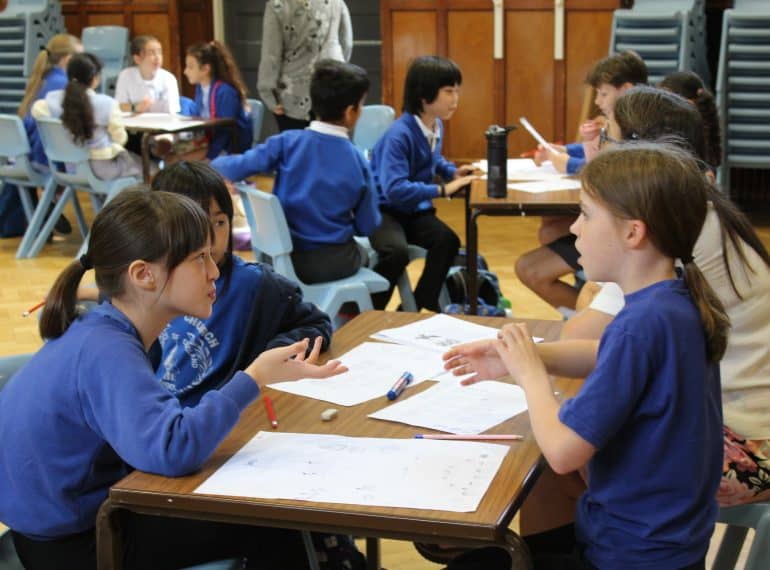
QE expanded its series of popular challenges for local primary school children this year, adding a humanities day to the programme.
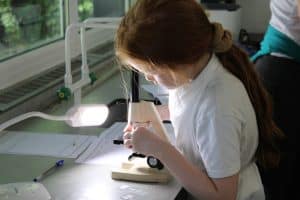 The events, which are part of QE’s partnerships work with the local community, are aimed at giving Year 5 girls and boys an early taste of secondary school education.
The events, which are part of QE’s partnerships work with the local community, are aimed at giving Year 5 girls and boys an early taste of secondary school education.
Headmaster Neil Enright said: “We are pleased to support local primary schools in this way.
“I know that our staff and pupils involved in running these enrichment activities greatly enjoy the opportunity to meet the visiting children.”
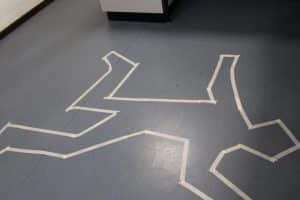 The first of the three days was the ever-popular Primary Forensics Workshop. The visitors were tasked with completing a number of experiments and analyses to work out who had murdered the Headmaster!
The first of the three days was the ever-popular Primary Forensics Workshop. The visitors were tasked with completing a number of experiments and analyses to work out who had murdered the Headmaster!
There were stations where the children could undertake: hair and fibre analysis using a microscope; fingerprint analysis, and blood spatter analysis (with a blood substitute).
The pupils worked to solve the ‘crime’, using the evidence they collected to build a case, while also weighing up the respective motives of the suspects.
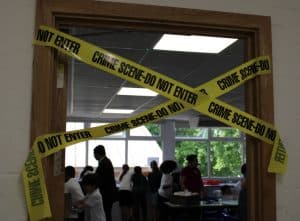 Boys from Year 12 helped staff run this workshop, engaging with the children at each station.
Boys from Year 12 helped staff run this workshop, engaging with the children at each station.
In the Maths and English Challenge, the girls and boys had to solve a series of games and puzzles that ranged from a cross-number round to a session looking at composing and performing poetry.
There was a focus on teamwork and collaboration. Each team had the support of a QE Year 7 pupil.
Special plaudits went to Foulds School pupils, who achieved a near-clean sweep of the prizes, having impressed across the various disciplines on the day.
The new humanities day hosted by the History, Geography and Economics departments comprised two separate activities.
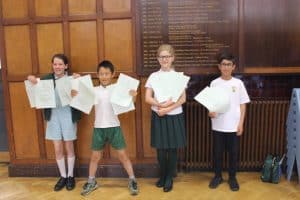 Firstly, teams were given the challenge of designing a castle on paper. They had to base their design on a certain set of criteria and follow a budget, requiring them to decide which features they wanted to prioritise.
Firstly, teams were given the challenge of designing a castle on paper. They had to base their design on a certain set of criteria and follow a budget, requiring them to decide which features they wanted to prioritise.
They then faced a number of scenarios, presenting both challenges and opportunities for their fortifications. Could their castle and kingdom survive?
“This was a way of exploring history and strategy in a fun and engaging way,” said Mr Enright. “The Year 5 pupils also had to adapt their plans as the scenarios unfolded, which meant teams had to communicate well and quickly make decisions.”
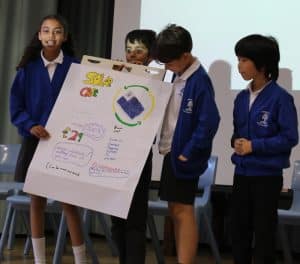 There was then a Sustainability Challenge run jointly by Geography and Economics. The children had to work in groups and devise a sustainable product. They designed their product, chose a logo and decided on their target market. Then each group presented to the other children in attendance. Among the ideas generated were: a mobile phone where the case is a solar panel and charges the phone, and a ‘plastic’ bottle where the bottle itself is biodegradable.
There was then a Sustainability Challenge run jointly by Geography and Economics. The children had to work in groups and devise a sustainable product. They designed their product, chose a logo and decided on their target market. Then each group presented to the other children in attendance. Among the ideas generated were: a mobile phone where the case is a solar panel and charges the phone, and a ‘plastic’ bottle where the bottle itself is biodegradable.
“Our staff were really impressed with the confidence shown by the children in their presentations and by the creativity they brought to bear in designing their products,” said the Headmaster.
Participating Barnet primary schools this year included: Underhill, Whitings Hill, Christchurch, and Foulds.
